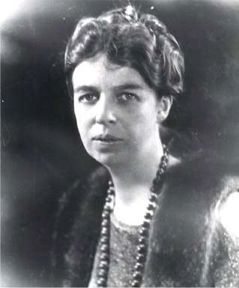 |
| Eleanor Roosevelt; mother, daughter, sister, wife. (http://www.firstladies.org/biographies/firstladies.aspx?biography=33) |
Eleanor Roosevelt once said, "Do what you feel in your heart to be right- for you'll be criticized anyway." Roosevelt referred to the amount of criticism she was put through when she spoke for a cause she believed in. Often called an "ugly duckling" by her friends and family, Roosevelt never had much self confidence. When the father she idolized died and the mother who never understood her passed, her legal guardian became her grandmother. At age fifteen her grandmother sent her to Allenswood School in England. Then, at seventeen she returned and met her future husband and also second cousin Franklin Delano Roosevelt. After their marriage Roosevelt was thrown into motherhood with a mother in law who believed the kids were really hers, and the affair between her husband and Lucy Merger, her secretary. This embarrassment proved to be a good thing because she began to live a life of her own. She gave women and those who suffered from the lack of equality among races an opportunity to work in decent jobs. She is well known for her promotions of civil rights for African American's, better conditions in the workplace, job openings for women, and stopping child labor. She was also known for the promotion of the World Trade Center because she believed that all the countries should come together. Throughout Roosevelt's life it has been an upward battle against criticism; however, she consistently steps out from the shadows and into the line of fire so that she could fight for what she believed in. Roosevelt demonstrated the courage to speak out when everyone makes judgments, the conviction to achieve her goals, and the selflessness to help anyone.
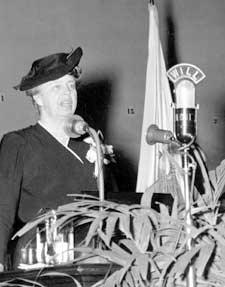 |
| Roosevelt often talked to women reporters to help (http://will.illinois.edu/about/history/) |
Roosevelt changed the dynamic of the country when finding the courage to step out from her husband's shadow and defend what she believed in. The push of infidelity powered Roosevelt to finally speak out about what she believed in. "Franklin's love of another woman brought her to almost total despair, and she emerged from the ordeal a different woman. Ended was the subordination to her mother-in-law and to the values and the world Sara represented; emergent was the realization that to build a life and interests of her own was not only what she wanted to do but what she had to do (Baughmen).” This was the push that Roosevelt needed to start to build her own life. As a woman scorned she had the right to want to be free of a man's control. She knew that she could use her husband’s infidelity to relate to women everywhere, and help them gain the rights they deserved. Even with her husband's reputation at stake Eleanor often spoke with women reporters to raise a sort of controversy on different topics of politics. "Despite her initial intent to focus on her social activities as First Lady, political issues soon became a central part of the weekly briefings. When some women reporters assigned to ER tried to caution her to speak off the record, she responded that she knew some of her statements would "cause unfavorable comment in some quarters"... [but] I am making these statements on purpose to arouse controversy and thereby get the topics talked about (Black).” Roosevelt knew that the people in the democracy deserved to know about what went on in their countries' politics. She wanted people to discuss and disagree about politics to raise debates among people. That is what politics are, a debate that needs to be disagreed upon because if they weren’t then we would be the perfect society and there is no such thing as a perfect society. Roosevelt's courage led her through hard times in her life which taught her that no matter what, keep your head held high.
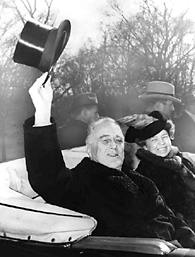 |
| Roosevelt was expected to retire after her husban (http://www.archives.gov/publications/prologue/2006/winter/fdr-emerges.html) |
Roosevelt displayed the conviction to achieve each and every one of her dreams. Despite the expectations the country placed on her to retire once her husband passed away, she continued to work towards helping and bettering the country. "After Franklin Roosevelt died in office in April 1945, Eleanor was expected to retire to a quiet, private life. However, by the end of the year she was back in public. America's new president, Harry S. Truman (1884-1972), made her the American representative to the United Nations Commission on Human Rights (Tyle).” No matter what people thought was acceptable Roosevelt only listened to what her heart was telling her. If she believed in her heart that what she was fighting for was right then she would. It never mattered what other people believed, because she spent her entire early life conforming to the mold that her mother in law and husband desperately tried to fit her in, it was time to be herself no matter what others thought of her. Roosevelt fought incredibly hard for women's rights and equality. "Eleanor supported appointments of women to government positions, and she was a strong voice in support of women's opportunities in general. She also promoted aid to young people, relief for miners trapped in some of the worst conditions of the Depression, and the civil rights of black Americans (McNeil, Hanes and Hanes).” She continuously fought to get people to accept equal rights for everyone no matter what gender or skin color. Even if the people around her did not agree with her choices, she continued to stand up for them. With the conviction to succeed in her goals, Roosevelt changed many lives.
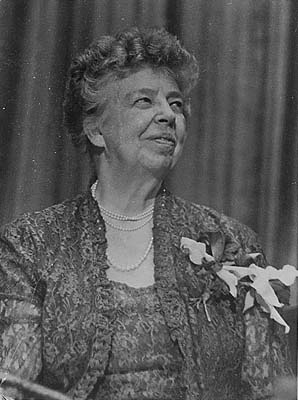 |
| Eleanor was commonly known for her desire to award (http://www.hudsonrivervalley.org/themes/eleanor.html) |
Selflessness shown through in all of Roosevelt's acts, because that's the person she was. Roosevelt cared greatly about women's rights and equality among races. "During the 1930s Eleanor was particularly concerned with creating equal opportunities for women and with making sure that appropriate jobs for writers, artists, musicians, and theater people became a key part of the New Deal employment program known as the Works Progress Administration (WPA). She also promoted the cause of Arthurdale, a farming community built by the government for unemployed miners in West Virginia. She was concerned with providing work for jobless youth, both white and black. Much more than her husband, she spoke out against racism and tried to aid the struggle of black Americans toward full citizenship (Tyle).” Roosevelt used her husband's election to help those less fortunate. She did not care how it would affect her by speaking out for worthy causes when she trusted the feeling in her heart about whether or not she considered it right. Especially in such a terrible economic time such as the Great Depression the hope that she gave everyone changed their life. Roosevelt cared deeply about her work and also understood the importance of the election to her husband. "Once FDR won the election, he asked her to resign her positions with the Democratic National Committee, the Todhunter School, the League of Women Voters, the Non-Partisan Legislative Committee and the Women's Trade Union League. She then announced that she would no longer take part in commercial radio events and that she would refrain from discussing politics in her magazine articles. Though she tried to avoid it, public expectation was redefining her career and it hurt. "If I wanted to be selfish," she confessed earlier to Hickok, "I could wish that he had not been elected (Black).” Roosevelt knew that the pettiness of resentment would not help her through the hurt that he caused by asking her to stop doing what she wanted to do. The committees Roosevelt worked for were her life and meant the world to her. They were her escape from her husband when he cheated on her and now he wanted her to leave them behind. Although resentment and pride often cloud the judgment of those in the public eye Eleanor Roosevelt does not let that deter her from helping those around her.
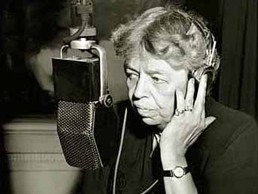 |
| Roosevelt often used the radio to convey her mess (http://www.nps.gov/elro/photosmultimedia/index.htm) |
Though everyone makes judgments, Roosevelt goes against odds and does not detract herself from the spitefulness of those around her and helps those who truly need because she never gives up when fighting for something she believes in. "Once First Lady, Eleanor Roosevelt broke precedent in a number of ways. The first involved efforts to publicize her views. She held weekly press conferences, limited to women reporters and often centering on women's issues. In January 1936, she began her newspaper column "My Day," distributed through United Features Syndicate. For its first three years, it was basically a women's column, but by 1939 it addressed general political topics. In 1941, she wrote a question-and-answer page for the Ladies' Home Journal, which in 1949 she moved to McCall's. Her tone might have been naive and her prose full of clichés, but she always communicated warmth, sincerity, and genuine concern. The same could be said about her radio program, begun in 1934, with proceedings going directly to the American Friends Service Committee. By 1939, she was so popular that WNBC dubbed her "The First Lady of Radio (Baughman).” Despite what everyone deemed socially acceptable, Roosevelt goes against the grain and fights for what she deems correct. In a time like the Great Depression everyone is fighting for themselves. It wasn't about helping those around you so much as being able to survive. No matter what the time or the situation Roosevelt fought for the people who had no one to fight for them. Roosevelt was criticized and applauded for all that she did; however, that did not stop her from speaking from her heart.
Black, Allida. "Bibliography of Anna Eleanor Roosevelt." The Eleanor Roosevelt Papers Project. Department of History at the GeorgeWashington University, 27062008. Web. 13 Dec 2010.
"Eleanor Roosevelt." American Decades. Ed. Judith S. Baughman, et al. Detroit: Gale, 1998. Gale Student Resources In Context. Web. 13 Dec. 2010.
"Roosevelt, Eleanor." Great Depression and the New Deal Reference Library. Ed. Allison McNeill, Richard C. Hanes, and Sharon M. Hanes. Vol. 2: Biographies. Detroit: UXL, 2003. 185-196. Gale Virtual Reference Library. Web. 13 Dec. 2010
Roosevelt, Eleanor. Personal Interview by Eleanor Roosevelt. Conversation. 10 Jan 2011.
"Roosevelt, Eleanor.” UXL Encyclopedia of World Biography. Ed. Laura B. Tyle. Vol. 9.Detroit: UXL, 2003. p1621- 1624.
Page created on 1/21/2011 12:00:00 AM
Last edited 1/21/2011 12:00:00 AM
